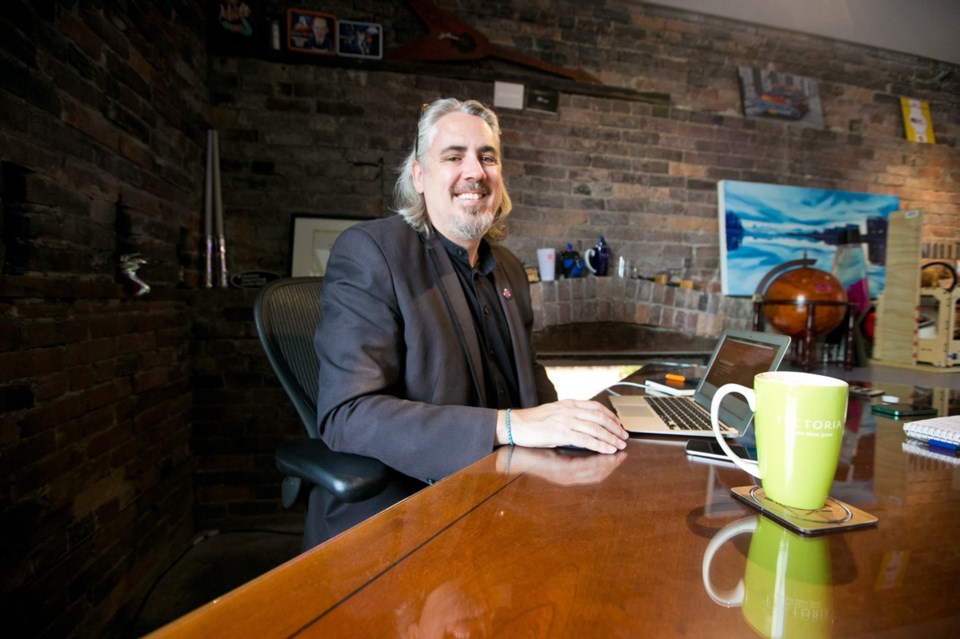Vancouver Island’s thriving high-tech industry is taking a star turn in the B.C. election campaign with all three major parties promising to help the sector grow across the province.
B.C. Liberal Leader Christy Clark, who tied her election hopes in 2013 to a liquefied natural gas industry that has yet to materialize, now talks about B.C. becoming “the new Silicon Valley.”
Her opponents, however, say she’s trying to make people forget her broken LNG promises while taking credit for an industry that grew without much government help.
“I think the tech sector is kind of going, ‘You know, we’ve been fine without you … please don’t pay too much attention to us,’ ” said NDP Leader John Horgan.
Clark, Horgan and B.C. Green Party Leader Andrew Weaver have all portrayed themselves as the best champions for an industry that employs 106,000 people at more than 10,000 companies.
“There’s a reason why we have three CEOs of tech companies running with us,” Weaver said. “They know our plan is actually based on four years of consultation with that sector. It’s not suddenly we’ve decided that tech is the way to go.”
Just having the province’s high-tech industry being talked about on the campaign trail alongside economic building blocks such as forestry, mining and tourism has been novel for the industry as a whole.
“The fact that tech is a political story is favourable. It’s something that has been overlooked for a number of years,” said Dan Gunn, chief executive of the Victoria Innovation, Advanced Technology and Entrepreneurship Council. The group is a resource and connection point for the Victoria tech sector.
“We’re pleased that those wanting to lead our governments and communities recognize the benefit and value of a strong tech sector and we look forward to them supporting it.”
Gunn said governments at all levels have roles to play in a healthy tech sector, but added the heavy lifting comes from within.
He said Victoria’s tech sector, which expects combined revenues of its 880 firms to exceed $4 billion and employ more than 15,000 directly this year, has been built on a foundation of diverse sub-sectors such as software development, ocean sciences, advanced manufacturing and systems integration.
“The reason it has taken hold is that it continues to mature and build on its own critical mass,” he said. “We now have more sophisticated leadership within the sector and more people can see opportunities in Victoria and B.C.”
Technology has also benefited from a relatively weak Canadian dollar, paying salaries in loonies but typically selling into the U.S. and around the world.
Gunn said the most important role governments play these days is letting other markets know about Victoria and B.C.
“We’re seeing more of this … governments playing a role of raising awareness on the global stage of the level of innovation and opportunity within their jurisdictions,” said Gunn.
Nanaimo Liberal candidate Paris Gaudet, on leave from her job as executive director of the tech organization Innovation Island, credits Clark with emphasizing the sector.
Gaudet said the venture capital tax credit, for instance, encourages investors to put money into small B.C. business to help them grow.
“The companies that I’ve worked with over the past 10 years — this is a game-changer for them in terms of competitiveness,” she said.
The Liberal platform promises to boost the industry further by adding 1,000 new science and technology grads, investing $87 million in the B.C. Tech Strategy over three years, ensuring provincial tech companies are first in line for contracts and pushing ahead with plans to teach coding in Grades 6 to 9.
The NDP pledges to invest $100 million to expand technology-related college and university programs, while partnering with post-secondary schools to build technology and innovation centres.
Horgan said the Liberals have wasted millions on failed information technology contracts with firms from outside B.C. and promised an NDP government will break up contract opportunities so that local start-up companies can bid on them.
“That leads to opportunities to grow, rather than being pushed out by [big firms],” he said.
Weaver said a Green government will appoint an innovation commissioner to advocate for the industry, provide up to $70 million over four years to help entrepreneurs leverage seed money, and invest $120 million over four years in partnerships with industry, schools and other governments to develop clean technology.
Both the Greens and NDP promise to make life more affordable for people, so that tech companies can recruit and retain employees.
On that note, Gunn said government can take some credit for setting the table for industry to thrive.
“Overall, a government’s job is to make sure we have good quality of life, whether that means affordability, great transportation or security,” he said.
“All of those things are important and we have so much to offer in B.C. that it has benefited the tech sector and continues to attract more entrepreneurs, staff and innovators.”
Gunn said some of the recent boom in growth is down to people choosing B.C. for what it has to offer in terms of quality of life.
“We have entrepreneurs creating great companies in the place they want to live,” he said.



